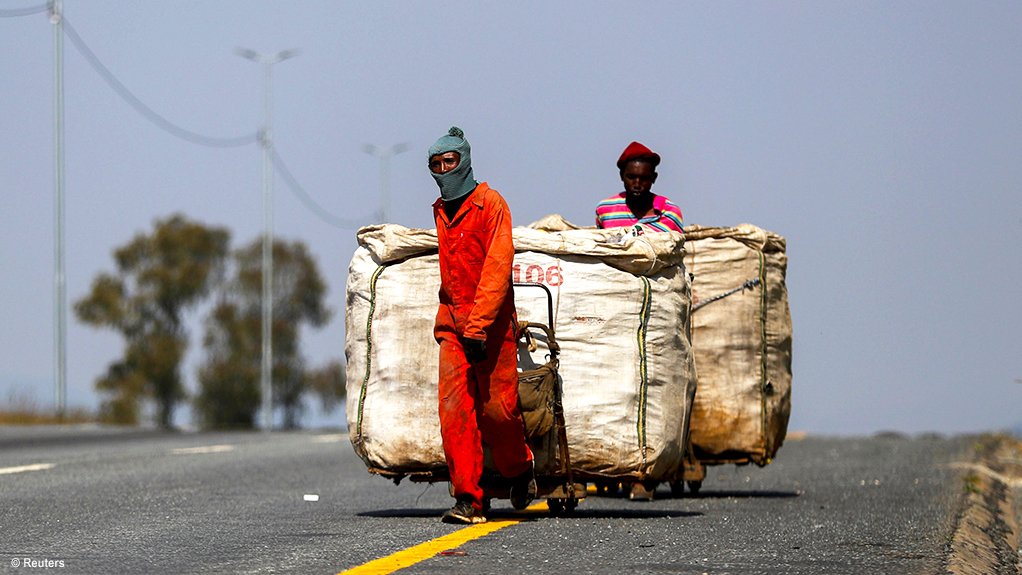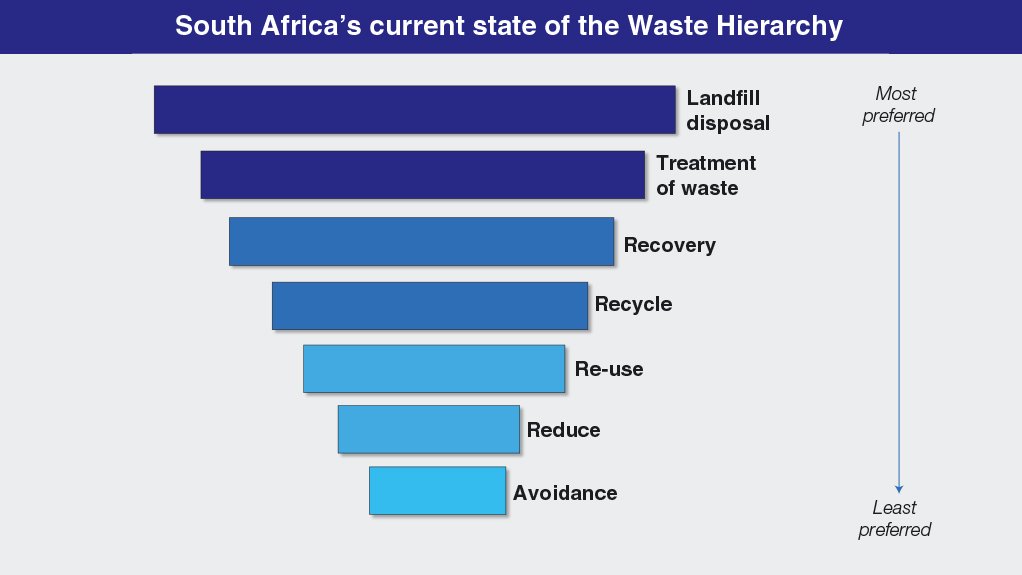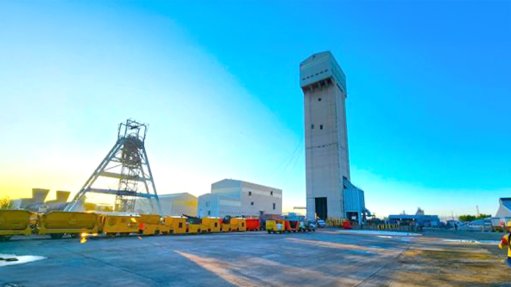Significant untapped potential in local waste economy




UNDERVALUED Informal waste reclaimers perform a much-needed recycling service in South Africa with little support or appreciation
Photo by Reuters
UPSIDE DOWN South Africa’s implementation of the Waste Hierarchy is completely inversed compared with other developed countries
RAJAS PILLAY Green economic empowerment seeks to address environmental concerns in concert with tackling unemployment
The current contribution of the waste economy to South Africa’s gross domestic product (GDP) could significantly increase if the importance of implementing the waste management hierarchy is fully recognised, says waste management company Interwaste human resources and transformation director Rajas Pillay.
Nonprofit organisation GreenCape’s ‘Waste 2020 Market Intelligence Report’ estimates that the local waste economy contributes about R24.3-billion to the GDP, supporting an estimated 36 000 formal jobs and a further 80 000 informal jobs.
“A paradigm shift needs to occur, whereby recycling is emphasised. By implementing the waste management hierarchy, we will embrace green economic empowerment (GEE),” she explains.
Pillay believes that such a paradigm shift, if widely and effectively implemented with full public- and private-sector buy-in, could result in increasing the GDP value of the local waste economy, not only creating many more jobs but also enhancing participants’ earning potential and bringing numerous environmental benefits.
The waste management hierarchy is a global best-practice framework, which Pillay says South Africa embraces in theory. However, in practice, the hierarchy is wholly reversed.
“Landfill disposal is meant to be a last resort, which it is in most developed countries. However, in South Africa, landfill disposal is the first resort,” she laments.
Pillay says one of the most significant barriers to implementing the waste hierarchy is inadequate information dissemination and education on recycling made available to the public. Such a lack of knowledge contributes to a general indifference towards recycling among the populace.
She advises that an aggressive education campaign should be rolled out by government – at national, provincial and municipal levels – with the support of the private sector, to raise awareness about the importance of recycling and how to execute it correctly.
“Education around recycling is critically important and is sorely lacking. The education and awareness campaign surrounding Covid-19 vaccinations is an example of how it can be achieved when there is sufficient will to do it,” she says.
GEE
An essential part of transforming the way South Africa handles waste is to embrace GEE as a way of integrating the informal recycling sector and altering the negative perceptions associated with it.
The concept of GEE is central to Pillay’s PhD thesis, which she is pursuing through the Da Vinci Institute for Technology Management. Her work is positioned as a transformative study and a case study on the Ekurhuleni municipal district.
The hope is that this localised study will prove useful as a synecdoche of some of the transformation challenges and opportunities in the waste management sector of the country.
Pillay explains to Engineering News that the novel GEE concept seeks to address not only environmental concerns but also unemployment by leveraging the significant untapped potential of the mostly informal waste reclaiming subsector. It is modelled after the idea of black economic empowerment but seeks to focus on empowering and transforming workers in the waste economy.
She says the negative stigma attached to working in the waste industry should be altered. Waste reclaimers or waste pickers – who are actively self-employed – are often seen as a blight and a nuisance, but they are actually providing a much-needed recycling service for communities.
“Waste reclaimers already make a significant contribution to recycling in South Africa, yet they are seldom acknowledged for their efforts,” Pillay notes, adding that their collective financial contribution to municipalities is significant. The financial contribution can be attributed to the savings made on landfill space, as well as municipal logistics and fuel costs.
Unfortunately, the informal nature of the waste reclaiming industry means that they are exposed to being exploited and underpaid. Additionally, insufficient infrastructure for pick-up and drop-off points means that waste reclaimers spend many hours a day travelling more than 15 km between points – usually on foot.
In many cases, with the right support and improved infrastructure to reduce travel distances, informal waste reclaimers could double or triple their output and earning potential. Currently, most waste reclaimers are unable to earn enough to adequately support themselves, although this could be remedied through GEE.
Pillay says the solution to these challenges does not necessarily lie in the formalisation of the waste reclaiming sector – an idea which many waste reclaimers oppose.
“What waste reclaimers want is more collaboration, but to retain their independence. They want support from municipalities and the public sector in general,” she explains, adding that this can be achieved by setting up a co-opted structure with multiple stakeholders.
Rather, an adequate management system should be devised for the sector through a collaborative approach between government and the public and private sectors.
Progress is being made, however, evidenced by the Waste Picker Integration Guideline for South Africa, published in August last year by the departments of Forestry, Fisheries and the Environment, and Science and Innovation, says Pillay.
The guidelines were issued in fulfilment of one of the objectives of the 2011 National Waste Management Strategy, which is to “provide guidance to municipalities and industry on measures to improve the working conditions of waste pickers”.
Article Enquiry
Email Article
Save Article
Feedback
To advertise email advertising@creamermedia.co.za or click here
Comments
Press Office
Announcements
What's On
Subscribe to improve your user experience...
Option 1 (equivalent of R125 a month):
Receive a weekly copy of Creamer Media's Engineering News & Mining Weekly magazine
(print copy for those in South Africa and e-magazine for those outside of South Africa)
Receive daily email newsletters
Access to full search results
Access archive of magazine back copies
Access to Projects in Progress
Access to ONE Research Report of your choice in PDF format
Option 2 (equivalent of R375 a month):
All benefits from Option 1
PLUS
Access to Creamer Media's Research Channel Africa for ALL Research Reports, in PDF format, on various industrial and mining sectors
including Electricity; Water; Energy Transition; Hydrogen; Roads, Rail and Ports; Coal; Gold; Platinum; Battery Metals; etc.
Already a subscriber?
Forgotten your password?
Receive weekly copy of Creamer Media's Engineering News & Mining Weekly magazine (print copy for those in South Africa and e-magazine for those outside of South Africa)
➕
Recieve daily email newsletters
➕
Access to full search results
➕
Access archive of magazine back copies
➕
Access to Projects in Progress
➕
Access to ONE Research Report of your choice in PDF format
RESEARCH CHANNEL AFRICA
R4500 (equivalent of R375 a month)
SUBSCRIBEAll benefits from Option 1
➕
Access to Creamer Media's Research Channel Africa for ALL Research Reports on various industrial and mining sectors, in PDF format, including on:
Electricity
➕
Water
➕
Energy Transition
➕
Hydrogen
➕
Roads, Rail and Ports
➕
Coal
➕
Gold
➕
Platinum
➕
Battery Metals
➕
etc.
Receive all benefits from Option 1 or Option 2 delivered to numerous people at your company
➕
Multiple User names and Passwords for simultaneous log-ins
➕
Intranet integration access to all in your organisation




















